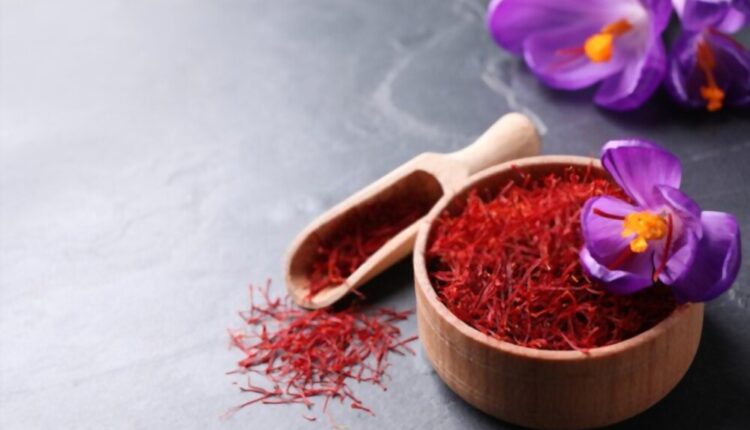Amazing Saffron Benefits: uses, risks, nutrition, and more
Saffron is an ancient spice that has been used for different purposes around the world. Most people know saffron by its golden color and rich aroma. However, not many people are aware of saffron’s many health benefits and nutrition. It’s been used for medicinal purposes for thousands of years in countries like Iran. However, it has only been a few years that scientists have discovered the unique properties of saffron.
That’s why, nowadays, more and more people are interested in purchasing this precious spice even though it’s the most expensive food property in the world! In addition to saffron benefits, consuming it might come with some health risks. So, in this article, we’ll go over saffron side effects and benefits to fully inform you before taking any actions. Keep reading!
Mind-blowing health benefits of saffron

Yes! We have all heard how labor-intensive harvesting saffron is. That’s why it’s even more expensive than gold; right?
But why do people spend thousands of dollars for purchasing this so-called “Red Gold”?
Check out our article on the Eating Saffron For Fair Skin
Fights cancer!
One of the most popular saffron benefits is being rich in antioxidants. But what does that have to do with cancer? Many studies prove that overproduced free radicals can cause cancer. In our body, accumulation of free radicals can impair cells function and cause cancer as a result.
What produces free radicals?
- Environmental pollutants
- Cigarette smoke
- Radiation solvents
- Industrial
- Certain drugs
- Ozone
Antioxidants, on the other hand, can neutralize free radicals and protect our body against them. And since saffron is rich in antioxidants, it can help your body cells eliminate free radicals and fight cancer.
In addition to that, accumulation of free radicals can lead to age-related macular degeneration (AMD). It affects eyesight in adults. So, saffron can improve eye-sight by eliminating free radical damage.
Helps with Alzheimer
According to recent studies, people who use saffron in their foods or take its supplements are less likely to get Alzheimer than people who don’t. Although there has not been extensive research in this area, a few cases successfully proved that saffron reduces Alzheimer’s symptoms.
Treat depression and anxiety

In some cultures, people use the term “sunshine spice” for saffron. Although the golden color of saffron reminds us of sunshine, it’s not the only explanation. Saffron taste and aroma can boost your mood and give you a feeling of happiness and peace.
Researchers have recently found that consuming saffron daily has the same effect on depression as Fluoxetine, Imipramine, and Citalopram. Moreover, saffron side effects are far less than using such conventional treatments.
Saffron benefits to reduce anxiety and moderate depression are not just because of its threads, but the petals are effective too. You can brew some tea with saffron petals and drink it with honey. It immediately alters your mood and make your day.
Improves ED (erectile dysfunction)
ED is a disorder that affects almost all men at least one time during their life. Nearly 150 million men throughout the world are currently suffering from ED. In traditional medicine, aphrodisiac substances can boost sexual behavior and desire. Saffron is has aphrodisiac properties which can help ED and treat it for good.
On the other hand, depression and anxiety are some of the main causes of ED. As we mentioned earlier, this golden spice can brighten your mood and help with anxiety. As a result, saffron can be a strong traditional medication for erectile dysfunction. Studies indicate that consuming 30 mg of saffron daily can treat or reduce ED in less than 4 weeks.
Check out our article on the How To Use Saffron For Skin Brightening?
Reduce PMS
Almost all women experience physical, emotional, and psychological symptoms during their period, which is called PMS (premenstrual syndrome). Some of the most common symptoms of PMS are as follows:
- Pain
- Headache
- Backache
- Mood swings
- Outburst
Saffron, just like other homemade remedies, can help and reduce some of these symptoms. Some studies show that saffron aroma can calm the body down almost instantly.
Helps with weight loss

One of the most noticeable saffron benefits is its impact on weight loss. How?
Saffron is very low in calorie. However, drinking or using saffron in your dishes can make you feel full. It reduces appetite and prevents snacking. As a result, it can help your diet and aid weight loss.
However, scientists are not sure what property in saffron reduces appetite. Some guess that mood alteration may have a role here. They claim that people with better mood are less likely to consume harmful snacks which attributes to gaining weight.
Reduce cardiovascular diseases
Obesity is one of the main problems that lead to cardiovascular diseases. As you learned saffron can help with that. Moreover, this so-called “red gold” have properties that can lower blood cholesterol and, as a result, unclog arteries.
Are saffron supplements as beneficial as its stigmas?
Unless your doctor suggests so, it’s better to use pure saffron instead of its supplements. The herb is always better than medicine; right?
Oral saffron supplements contain other properties that aim certain disorders. But most of saffron side effects have been seen in people who used its supplements.
Make a habit of adding pure saffron threads to your daily or weekly diet and see its impressive affects in no time. In some cultures, such as Iranian, saffron is an important part of the cuisine. If you don’t know how to use saffron or add it to your diet, look for such cuisines. You’ll find many foods and drinks recipes to use for your next meal.
Does saffron have any side effects?
In short; yes. Using saffron comes with risks; just like any other spice or food supplement. However, when we talk about saffron side effects, it’s not a long list of horrible diseases like what pharmacists write on pills. It’s more like trying peanut butter for the first time.
Using too much of anything can be bad for our health and comes with risks. The same applies to saffron. Overusing saffron can lead to:
- Drowsiness
- Stomach problems
- Nausea
- Vomiting
- Allergic reactions
On the other hand, using saffron might not be good for people with contain conditions. For example, although one of saffron benefits is mood swing, it can be harmful for people with bipolar disorder. Of course, it’s not been scientifically proven, but doctors don’t recommend saffron for such conditions.
On the other hand, it’s traditionally recommended not to use saffron if you are pregnant or breastfeeding. From old times, people believed that consuming saffron during pregnancy may lead to miscarriage.
How much saffron is too much?
Consuming 12 to 20 grams of saffron are considered very dangerous and even fatal. Some cases showed signs of poisoning when consuming 5 grams a day. So, saffron side effects are mainly attributed to overusing it.
Then, how much of saffron is safe to use?
It’s better to keep your daily doses down to 100 mg or less. If you are using saffron for its medicinal properties, to get results, it’s better to take a 100 mg for 26 weeks. Increasing the amount or the period of use should be avoided.
Source:


